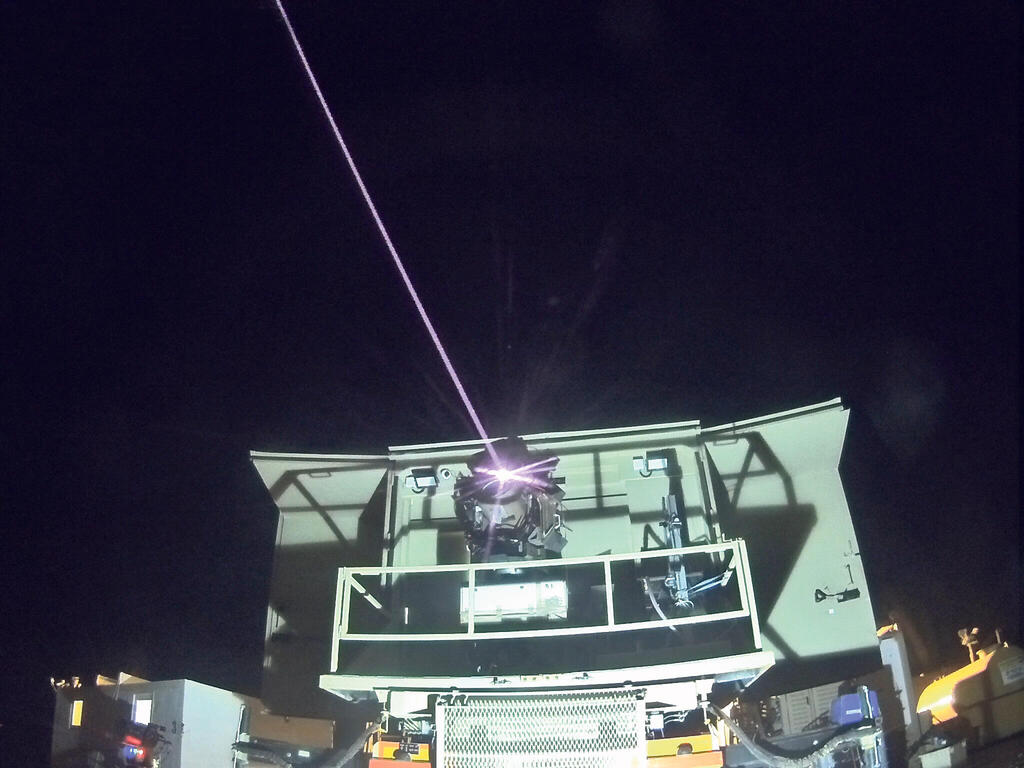Rafael’s engineers say the home front may never need to hear another warning siren once their new laser system is ready – maybe even by next year.
By Batya Jerenberg, World Israel News
A leading Israeli defense company is putting the finishing touches on a new system that will cause incoming rockets to explode long before they reach the country’s border, and it may be ready as soon as next year, Calcalist reported Tuesday.
Rafael Advanced Defense Systems’ R&D department says the company has almost completed the “Light Shield” (‘Magen Ohr’ in Hebrew), a laser that will intercept airborne threats ranging from mortar bombs, rockets and drones to anti-tank missiles.
“We are currently at a peak stage in the full development of the system,” said its chief engineer, Dr. Yohai, who has been working on the project for the past 17 years in conjunction with the Defense Ministry’s weapons development department.
The system has just successfully undergone a major test, Yohai said, and he expects that in “one of the future confrontations” with Hamas, his team will put Light Shield to use in the field. “
We’ll then take the data home and study it,” he said, in order to develop it even further. But “this system learns,” he added. “Like the Iron Dome, it improves itself all the time.”
The heart of the system is its laser targeter, which looks like a large camera lens. When an enemy launch is detected, it gives off an invisible beam that “cooks” the rocket with 100 kilowatts of heat concentrated into a beam the diameter of a 10-shekel coin. The threat is neutralized almost instantaneously, as it literally works at the speed of light.
If the system works as planned, it could spell an end to the phenomenon of men, women and children racing to a shelter when a warning siren sounds – because there may be no need for such a siren.
“Why should the man from Sderot have to wake up in the middle of the night to run to the protected area if we already intercepted the threats long before they crossed the border?” said Maj. Hananel, one of the leaders of the R&D team from the defense ministry side. “There will be quiet. For us, this is a complete negation of the enemy’s capabilities.”
Its cost is also a major factor in the steady backing it has received from the defense ministry, the major said, noting that each Tamir interceptor of the Iron Dome costs about $50,000, and sometimes two are launched to ensure that a rocket shot by Hamas or Hizbollah will not hit a populated area.
The enemy, he said, keeps launching such rockets, even though most are intercepted, for two main reasons.
“He understands that he is still rushing us to shelters, disrupting our daily routine and occasionally also hitting us…[and] understands that for every such cheap and simple rocket, we launch a super-advanced interceptor missile that costs a fortune.”
Thus, he said, “The enemy is waging an economic war with us.”
“The initial benefit of Magen Ohr is in the dramatic improvement in our position in [this] war,” he explained, because a laser “is simply light,” and the main cost of use is just the electric bill for the generators it needs to work.
Light Shield cannot replace the Iron Dome anti-missile system, however, because it is not a perfect product. Stormy weather, fog and sandstorms are examples of factors that limit its function for now. The engineers also refused to divulge to Calcalist exactly how often it could work within a specific amount of time.
Still, the system will be an extraordinarily valuable addition to the defensive screen that Israel has built around itself, and for Maj. Hananel, the goal is clear.
“I want us to reach a situation that we cause the enemy to completely despair,” he said. “To understand that we have laser targeters deployed wherever necessary, that [he] shoots what he wants at us but everything is intercepted and explodes on him all the time, almost at the moment of the launch itself, long before it reaches Israeli territory and threatens someone or something here.”


